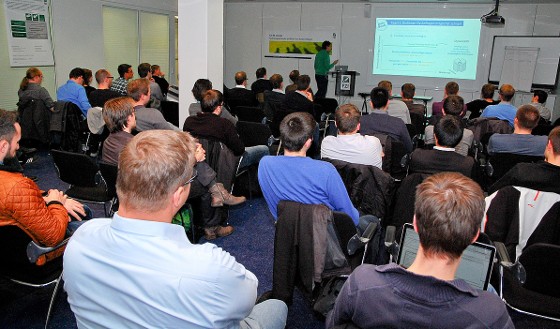Today, we released version 1.9 of our Kieker framework for application performance monitoring and dynamic software analysis: https://kieker-monitoring.net/
Quickstart Guide Now Available
Our new quickstart guides for Kieker demonstrate how to easily monitor and analyze Java applications with Kieker. Our first guide introduces Kieker from the command-line. The second guide demonstrates Kieker with Eclipse. Note, that the guides are written for the upcoming Kieker 1.9 release as well as for our current nightly builds.
Poster Award at ICPE 2014
 Out of the 20 posters that were presented during the poster/demo session on Tuesday at the ICPE 2014 in Dublin, ours has been elected as the best poster. The election was conducted during the poster session by the attendees of the presentations by putting stickers on posters that were counted afterwards.
Out of the 20 posters that were presented during the poster/demo session on Tuesday at the ICPE 2014 in Dublin, ours has been elected as the best poster. The election was conducted during the poster session by the attendees of the presentations by putting stickers on posters that were counted afterwards.
Continue reading
Kieker Tutorial at ICPE 2014
At the 5th ACM/SPEC International Conference on Performance Engineering (ICPE 2014), we gave a 2-hour tutorial. The slides and instructions for the interactive parts, are publicly available:
- Slides: http://eprints.uni-kiel.de/23928/ (including handout version)
- Instructions for interactive parts: http://trac.kieker-monitoring.net/wiki/tutorials/201403icpe/

New Kieker Poster
 Just in time for the Software Engineering 2014 (SE 2014) we finished a new Kieker poster. Feel free to use it in order to advertise for Kieker!
Just in time for the Software Engineering 2014 (SE 2014) we finished a new Kieker poster. Feel free to use it in order to advertise for Kieker!
Everything in Sight: Kieker’s WebGUI in Action
The content of the following blog entry is taken from our tutorial paper “Everything in Sight: Kieker’s WebGUI in Action” we presented at the Joint Kieker/Palladio Days 2013. If you are interested in more details, we recommend you to take a look at the full paper and the presentation. The WebGUI can be downloaded here. Continue reading
Tom Frotscher Wins 2013 b+m SSEP Award for Thesis on Kieker’s OPAD
Tom Frotscher wins the 2013 Software & Systems Engineering Award (b+m SSEP) for his Master’s thesis on “Architecture-Based Multivariate Anomaly Detection for Software Systems”. Since 2011, the annual b+m SSEP jury elects an excellent thesis submitted to the Kiel University’s Computer Science Department based on scientific quality and practical relevance . Tom’s thesis, supervised jointly by the Universities in Kiel and Stuttgart, extends the initial work on Kieker’s Online Performance Anomaly Detection (OPAD) approach by Tillmann Bielefeld who received the b+m SSEP in 2012. Tom’s thesis was again conducted in close collaboration with Xing AG, whose well-known business networking platform served as the case study system. Continue reading
Kieker’s Development in Five Minutes
Using the tool Gource (http://code.google.com/p/gource/), we created a nice visualization showing the development of Kieker in only five minutes. The video contains parts of our Git history and shows not only how the project has grown since 2008, but also how many different developers already contributed to the project.
Thanks to Fenil Conic (@fenilconic) for the music (Hollywood Reality 3).
Roughly 50 Participants Attended Kieker/Palladio Days 2013
The Symposium on Software Performance: Joint Kieker/Palladio Days 2013, which took place November 27-29 (Wed-Fri), 2013 in Karlsruhe, Germany, brought together researchers and practitioners interested in all facets of software performance, ranging from modeling and prediction to monitoring and management. The symposium was organized by two already established user groups: for the first time, the Kieker and the Palladio communities had a joint meeting in form of this symposium. Kieker is a well-established tool and approach for monitoring software performance of complex, large, and distributed IT systems. Palladio is a likewise-established tool and approach for modeling software architectures of IT systems and for simulating their performance. However, contributions were not limited to these two communities but we also welcomed contributions from the field.
Reverse Engineering of Kieker
In our master project, we used STAN4j and Visual Paradigm to carry out a static analysis of Kieker 1.7 and rebuild its architecture. As shown in Figure 1, Kieker consists of four components named common, monitoring, analysis, and tools.
Continue reading
